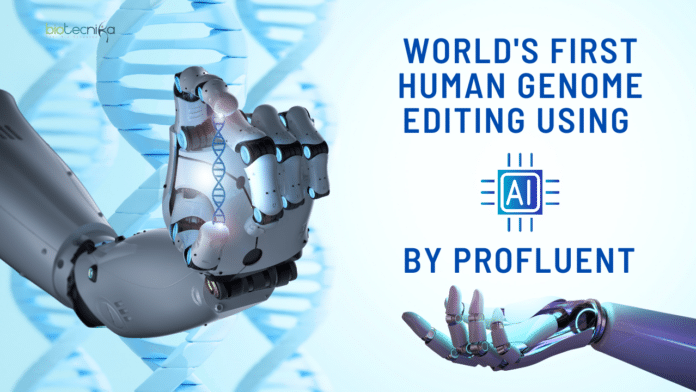World’s First Human Genome Editing With AI
A recent breakthrough study unveils the world’s first precision gene editing conducted with molecules entirely devised through artificial intelligence (AI). Profluent, a renowned company in AI-driven biotechnology, led this research study. Profluent’s researchers have designed innovative gene editors using AI’s capabilities, marking a significant advancement in AI-guided biological design. This pioneering approach promises to reshape the landscape of gene editing, accelerating advancements in therapeutic, agricultural, and scientific domains.
The protein engineering community has traditionally relied on discovery-based methods to develop functional proteins. However, the advent of large generative protein language models offers a paradigm shift by enabling the intentional design of proteins tailored for specific purposes. In this study, researchers at Profluent utilized AI to design precision gene editors, aiming to revolutionize gene editing techniques.
We are thrilled to announce the first ever successful precision editing of the human genome with a gene editor designed from scratch with AI.https://t.co/EpSbFw4yaY pic.twitter.com/xa3lvefSLx
— Profluent (@ProfluentBio) April 22, 2024
CRISPR-Cas9 Gene Editing System:
The core of CRISPR-Cas9 gene editing systems lies in the Cas9 protein, which functions as an RNA-guided nuclease capable of precisely targeting and editing specific sites within the human genome. However, designing effective
gene editors presents significant challenges due to the intricate spatial and temporal interactions required between multi-domain proteins, DNA, and RNA.AI-Driven Design:
To address these challenges, researchers at Profluent trained large language models (LLMs) on an extensive dataset of diverse CRISPR-based gene editing systems. This dataset, referred to as the CRISPR-Cas Atlas, encompasses millions of CRISPR-Cas proteins, expanding the known natural diversity of these systems. By harnessing AI, researchers generated novel CRISPR-Cas proteins with enhanced diversity, offering a vast array of potential gene editing solutions.
Functional Validation:
The AI-designed gene editors were rigorously evaluated for their functionality in human cells. The top-performing gene editor, named OpenCRISPR-1, demonstrated comparable or improved activity and specificity relative to existing gene editing systems. Notably, OpenCRISPR-1 exhibited significantly reduced off-target effects, highlighting its potential for precise genome editing applications.
Implications and Future Directions:
The successful demonstration of precision gene editing using AI-designed molecules represents a significant milestone in the field of biotechnology. OpenCRISPR-1, the flagship AI-generated gene editor developed by Profluent, is poised to catalyze innovation and development in gene editing applications. By releasing OpenCRISPR-1 to the public domain, Profluent aims to democratize access to advanced gene editing technologies, fostering collaboration and accelerating progress towards addressing critical societal needs.
In conclusion, integrating AI into the design of gene editing systems heralds a new era of precision genome modification. Profluent’s groundbreaking research signifies the potential of AI-driven innovation in biotechnology. With Profluent at the forefront, the future holds promising opportunities for advancing human health, agriculture, and scientific discovery through precise genome editing.
World’s First Human Genome Editing With AI – Source



























